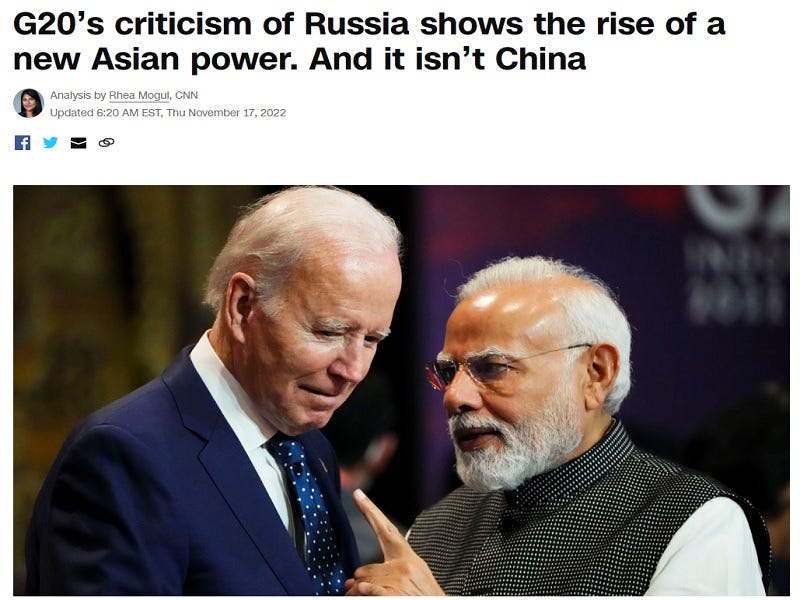CNN Is Half-Wrong & Half-Right About India’s Impact At The G20
CNN’s article did a journalistic service by drawing attention to India’s newfound role in International Relations at this sensitive moment of the global systemic transition even though it still misportrayed that multipolar Great Power’s approach to Russia. In any case, it was a pleasant surprise to see that my insight over nearly the past nine months has finally gone mainstream after it became impossible to ignore, and hopefully similar such pieces from Mainstream Media will soon follow.
CNN’s Rhea Mogul headlined a piece on Thursday about how “G20’s criticism of Russia shows the rise of a new Asian power. And it isn’t China”, which is half-wrong but also half-right. The first part regarding the group’s criticism of Russia and attributing that to India is wrong, while the second about that country’s performance at this year’s G20 Summit subtly outshining China’s is right. The present piece will explain this dichotomy a bit more in depth.
Beginning with what Mogul got wrong, the event’s joint statement didn’t criticize Russia in the way that she falsely presented it as. The sentence that she referenced referred to the context in which the signees reaffirmed their countries’ previously stated positions towards the Ukrainian Conflict, including the UN Resolution from early March. That last-mentioned example did indeed criticize Russia, but India abstained, hence why it’s inaccurate to claim that it supported that specific document’s harsh wording.
Furthermore, the inclusion of Prime Minister Modi’s much-discussed line from his meeting with President Putin in mid-September on the sidelines of the SCO Summit in Samarkand about how “Today’s era must not be of war” also wasn’t a criticism of Russia’s special operation either. Rather, it was simply the reaffirmation of India’s pragmatic policy of principled neutrality towards the Ukrainian Conflict wherein it’s consistently supported a political solution instead of a military one.
That quip was grossly misportrayed, however, including by putatively Russian-friendly members of the Indian intelligentsia like former Ambassador M.K. Bhadrakumar. “India’s Former Foreign Secretary & Ambassador To Russia Clarified Modi’s SCO Remarks To Putin”, which the serving Russian Ambassador to India confirmed was the correct interpretation. Furthermore, “India Discredited All Those Who Falsely Claimed That It’s Turning Against Russia” by abstaining from October’s anti-Russian UN Resolution.
Nevertheless, it remained fashionable in the US-led West’s Mainstream Media (MSM) to continue deliberately misportraying the Indian leader’s intent behind his now-famous words as evidenced by CNN’s examined report. To Mogul’s credit, however, she cited and hyperlinked to a top Indian media report that accurately informed their audience about how Prime Minister Modi’s remark helped pragmatically bridge the divide between the G20’s diverse participants in finalizing their joint statement.
It's at this point where it’s appropriate to move along to talking about what her article got right, namely that India did indeed subtly outshine China at the G20. By emerging as the kingmaker in the New Cold War through its careful balancing act between the US-led West’s Golden Billion and the jointly BRICS- and SCO-led Global South of which it’s a part, which I earlier explained at length here before it became impossible for the MSM to ignore, India’s geostrategic role has now become indispensable.
No objective observer can deny that this rising Great Power is smack dab in the center of the global systemic transition to multipolarity, thus imbuing it with outsized influence in shaping events. Coincidentally, professor in International Relations at King’s College London Harsh V. Pant echoed my recent conclusion that Prime Minister Modi’s G20 remarks “gave voice to the whole Global South” when telling Mohan in her article that India’s hosting of next year’s summit achieves precisely that.
In his words, that role is “very much of being the voice of the developing world and the global South”, which is true and suggests that he might even have been influenced by my insight that I shared two days prior to the publication of his own uncannily similar remarks. Moving along, CNN’s piece also accurately presents India as an emerging counterweight to China, albeit one that’s attempting to balance it in a friendly, gentle, and non-hostile way instead of the unfriendly, harsh, and hostile one that the US wants.
I’ve also analyzed this at length, even recently concluding that “The Ukrainian Conflict Might Have Already Derailed China’s Superpower Trajectory” partially due to the fact that the unexpected acceleration of India’s rise in global affairs throughout the course of that proxy war created the systemic conditions whereby the People’s Republic will struggle to achieve its speculative superpower ambitions. The preceding hyperlink explains the rationale behind that purposely provocative insight more in detail.
Returning to the G20 itself, Mohan’s article did a journalistic service by drawing attention to India’s newfound role in International Relations at this sensitive moment of the global systemic transition even though it still misportrayed that multipolar Great Power’s approach to Russia. In any case, it was a pleasant surprise to see that my insight over nearly the past nine months has finally gone mainstream after it became impossible to ignore, and hopefully similar such pieces from MSM will soon follow.




